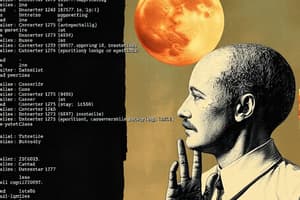Podcast
Questions and Answers
What does the API provide to application programmers?
What does the API provide to application programmers?
- A collection of system calls that must be memorized
- A set of commands for direct hardware manipulation
- A programming language that allows for low-level programming
- A set of functions along with their parameters and return values (correct)
Which API is used primarily for POSIX-based systems?
Which API is used primarily for POSIX-based systems?
- Linux API
- POSIX API (correct)
- Win32 API
- Java API
What is one main benefit of using an API in program development?
What is one main benefit of using an API in program development?
- Program compatibility with any device
- Increased memory usage
- Program portability across systems supporting the same API (correct)
- Direct access to hardware resources
How do APIs interact with system calls?
How do APIs interact with system calls?
Which programming language is associated with Java API?
Which programming language is associated with Java API?
What is the primary function of a command line interpreter (CLI)?
What is the primary function of a command line interpreter (CLI)?
Which of the following best describes system calls?
Which of the following best describes system calls?
What role does protection play in a multiuser system?
What role does protection play in a multiuser system?
What is a characteristic of touchscreen interfaces compared to traditional interfaces?
What is a characteristic of touchscreen interfaces compared to traditional interfaces?
Which of the following operating systems is known for having both a GUI and CLI?
Which of the following operating systems is known for having both a GUI and CLI?
Flashcards are hidden until you start studying
Study Notes
Operating System Services
- The operating system provides services to control and manage computer resources for efficient use, protection, and security.
- Protection involves ensuring controlled access to system resources.
- Security safeguards the system from unauthorized external access through user authentication and protection of external input/output devices.
Command Line Interpreter (CLI)
- Allows direct command entry.
- Can be kernel-based or implemented as a system program.
- Users can access various flavors, or shells.
- Commands can be built-in or be names of programs.
- CLI fetches commands from users and executes them.
User Interface - GUI
- User-friendly desktop metaphor, often involving the mouse, keyboard, and monitor.
- Icons represent files, programs, actions, and other entities.
- The mouse interacts with objects in GUI for various actions like providing information, options, executing functions, and navigating directories.
- Invented at Xerox PARC.
- Many systems include both CLI and GUI interfaces.
Touchscreen Interfaces
- Require a new interface design as a mouse is often unnecessary or infeasible.
- Actions and selections are made through gestures.
- A virtual keyboard is used for text entry.
- Voice commands are also a feature.
System Calls
- Provide programming interface to OS services.
- System calls are usually implemented as functions, typically written in a high-level language like C or C++.
- For lower-level access, they are implemented in Assembly Language.
Application Program Interface (API)
- Used by application developers for seamless interactions with the operating system.
- Provides a set of functions with specific parameters and return values.
- Examples of common APIs include Win32 API for Windows, POSIX API for POSIX-based systems, and Java API for the Java Virtual Machine.
- Often involves behind-the-scenes calls to system calls.
Benefits of Using API
- Program portability: Applications can be compiled and run on any system supporting the same API.
- Ease of programming: Actual system calls offer greater detail than the API, making programming straightforward.
API - System Call - OS Relationship
- The application program uses the API for interacting with the operating system.
- The API invokes the appropriate system call.
- The system call then interacts with the operating system kernel.
Types of System Calls
- Process control
- File management
- Device management
- Information maintenance
- Communications
- Protection
Examples of Windows and Unix System Calls
- Windows system calls follow conventions like "CreateProcess" or "ReadFile."
- Unix system calls use more succinct names like "fork" or "exec."
System Services
- System programs provide a convenient environment for program development and execution.
- File manipulation: Creating, deleting, copying, renaming, printing, dumping, listing, and manipulating files and directories.
- Status information: Obtaining system information like date, time, available memory, disk space, and number of users.
- Programming language support: Offering compilers, assemblers, debuggers, and interpreters.
- Program loading and execution: Providing absolute loaders, relocatable loaders, linkage editors, and overlay-loaders.
- Communications: Establishing virtual connections and facilitating messaging, browsing, emailing, remote login, and file transferring.
- Background Services: Launching at boot time and providing facilities like disk checking, process scheduling, error logging, and printing. These services operate in user context. - Also known as services, subsystems, or daemons.
- Application programs: User-run programs that are not typically considered part of the OS.
Linkers and Loaders
- Source code is compiled into relocatable object files, which can be loaded into any physical memory location.
- The linker combines these object files into a single executable file, including necessary libraries.
- The loader brings the executable file from secondary storage into memory for execution.
- Relocation assigns final addresses to program parts and adjusts code and data accordingly.
- Dynamically linked libraries (DLLs in Windows) are loaded only when needed and shared by all users utilizing the same library version.
Why Applications are Operating System Specific
- Applications compiled on one operating system are often not executable on another due to differences in system calls, file formats, and other OS-specific features.
Studying That Suits You
Use AI to generate personalized quizzes and flashcards to suit your learning preferences.




